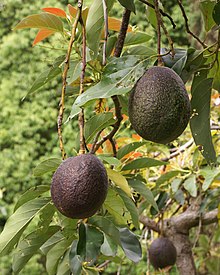| Avocado | |
|---|---|

| |
| Avocado fruit and foliage, Réunion island | |

| |
| Whole and halved Hass avocados grown in Colombia | |
| Scientific classification | |
| Kingdom: | Plantae |
| Clade: | Tracheophytes |
| Clade: | Angiosperms |
| Clade: | Magnoliids |
| Order: | Laurales |
| Family: | Lauraceae |
| Genus: | Persea |
| Species: | P. americana
|
| Binomial name | |
| Persea americana | |
| Synonyms[2] | |
|
synonymy
| |
The avocado, alligator pear or avocado pear (Persea americana) is an evergreen tree in the laurel family (Lauraceae). It is native to the Americas and was first domesticated in Mesoamerica more than 5,000 years ago. It was prized for its large and unusually oily fruit.[3] The tree likely originated in the highlands bridging south-central Mexico and Guatemala.[4][5][6] Avocado trees have a native growth range from Mexico to Costa Rica.[7] Its fruit, sometimes also referred to as an alligator pear or avocado pear, is botanically a large berry containing a single large seed.[8] Sequencing of its genome showed that the evolution of avocados was shaped by polyploidy events and that commercial varieties have a hybrid origin.[9] Avocado trees are partly self-pollinating, and are often propagated through grafting to maintain consistent fruit output.[10] Avocados are presently cultivated in the tropical and Mediterranean climates of many countries.[4] Mexico is the world's leading producer of avocados as of 2020, supplying nearly 30% of the global harvest in that year.[11]
The fruit of domestic varieties have smooth, buttery, golden-green flesh when ripe. Depending on the cultivar, avocados have green, brown, purplish, or black skin, and may be pear-shaped, egg-shaped, or spherical. For commercial purposes the fruits are picked while unripe and ripened after harvesting. The nutrient density and extremely high fat content of avocado flesh are useful to a variety of cuisines and are often eaten to enrich vegetarian diets.[12]
In major production regions like Chile, Mexico and California the water demands of avocado farms place strain on local resources.[13] Avocado production is also implicated in other externalities, including deforestation and human rights concerns associated with the partial control of their production in Mexico by organized crime.[14][15][16][17] Global warming is expected to result in significant changes to the suitable growing zones for avocados, and place additional pressures on the locales in which they are produced due to heat waves and drought.[18][19]
- ^ Wegier, A., Lorea Hernández, F., Contreras, A., Tobón, W. & Mastretta-Yanes, A. 2017. Persea americana (errata version published in 2018). The IUCN Red List of Threatened Species 2017: e.T96986556A129765464. https://dx.doi.org/10.2305/IUCN.UK.2017-3.RLTS.T96986556A96986588.en. Downloaded on 01 May 2021.
- ^ "Persea americana Mill". World Flora Online. The World Flora Online Consortium. 2022. Retrieved 25 May 2022.
- ^ "Avocado History". Avocados From Mexico. 18 May 2017. Retrieved 24 September 2022.
- ^ a b Morton JF (1987). Avocado; In: Fruits of Warm Climates. Center for New Crops and Plant Products, Department of Horticulture and Landscape Architecture, Purdue University, West Lafayette, IN. pp. 91–102. ISBN 978-0-9610184-1-2.
- ^ "What's in a name?". University of California. Retrieved 27 March 2016.
- ^ Chen, H; Morrell, PL; Ashworth, V; de la Cruz, M; Clegg, MT (2008). "Tracing the Geographic Origins of Major Avocado Cultivars". Journal of Heredity. 100 (1): 56–65. doi:10.1093/jhered/esn068. PMID 18779226.
- ^ "Persea Americana Avocado".
- ^ Storey, W. B. (1973). "What kind of fruit is the avocado?". California Avocado Society 1973–74 Yearbook. 57: 70–71.
- ^ Rendón-Anaya, Martha; Ibarra-Laclette, Enrique; Méndez-Bravo, Alfonso; Lan, Tianying; Zheng, Chunfang; Carretero-Paulet, Lorenzo; Perez-Torres, Claudia Anahí; Chacón-López, Alejandra; Hernandez-Guzmán, Gustavo; Chang, Tien-Hao; Farr, Kimberly M.; Barbazuk, W. Brad; Chamala, Srikar; Mutwil, Marek; Shivhare, Devendra (20 August 2019). "The avocado genome informs deep angiosperm phylogeny, highlights introgressive hybridization, and reveals pathogen-influenced gene space adaptation". Proceedings of the National Academy of Sciences. 116 (34): 17081–17089. Bibcode:2019PNAS..11617081R. doi:10.1073/pnas.1822129116. ISSN 0027-8424. PMC 6708331. PMID 31387975.
- ^ "Growing avocados: flowering, pollination and fruit set". Government of Western Australia: Department of Primary Industries and Regional Development.
- ^ Cite error: The named reference
faostatwas invoked but never defined (see the help page). - ^ Dreher, Mark L.; Davenport, Adrienne J. (1 January 2013). "Hass Avocado Composition and Potential Health Effects". Critical Reviews in Food Science and Nutrition. 53 (7): 738–750. doi:10.1080/10408398.2011.556759. ISSN 1040-8398. PMC 3664913. PMID 23638933.
- ^ Cite error: The named reference
footprintwas invoked but never defined (see the help page). - ^ "The Shocking Environmental Effects of Avocado Farming". Vox Nature. 17 May 2019. Archived from the original on 28 July 2022. Retrieved 26 April 2022.
- ^ "Avocado consumption: environmental and social considerations". MSU Extension. 24 August 2017. Retrieved 26 April 2022.
- ^ Khan, Nadeem; Kakabadse, Nada Korac-; Skouloudis, Antonis (17 November 2021). "Socio-ecological resilience and environmental sustainability: case of avocado from Mexico". International Journal of Sustainable Development & World Ecology. 28 (8): 744–758. Bibcode:2021IJSDW..28..744K. doi:10.1080/13504509.2021.1902419. ISSN 1350-4509. S2CID 233607375.
- ^ Bravo-Espinosa, M., Mendoza, M.E., Carlo ́n Allende, T., Medina, L., S ́aenz-Reyes, J.T., Pa ́ez, R., 2014. Effects of converting forest to avocado orchards on topsoil properties in the trans-Mexican volcanic system, Mexico. Land Degrad. Dev. 25 (5), 452–467. https://doi.org/10.1002/ldr.2163.
- ^ "What climate change means for the future of coffee, cashews, and avocados". National Geographic Environment. 26 January 2022. Archived from the original on 26 January 2022. Retrieved 26 April 2022.
- ^ Grüter, Roman; Trachsel, Tim; Laube, Patrick; Jaisli, Isabel (26 January 2022). "Expected global suitability of coffee, cashew and avocado due to climate change". PLOS ONE. 17 (1): e0261976. Bibcode:2022PLoSO..1761976G. doi:10.1371/journal.pone.0261976. ISSN 1932-6203. PMC 8791496. PMID 35081123.
